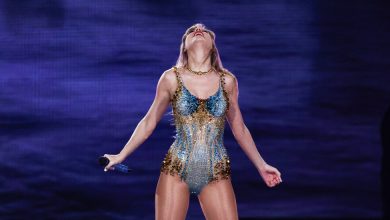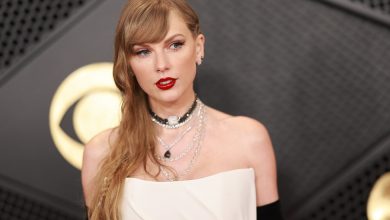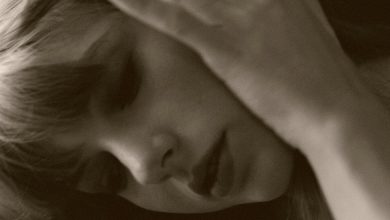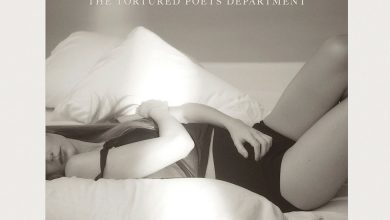One of Jussie Smollett’s Attackers Tells Court It Was All Staged

Jussie Smollett, frustrated by what he saw as a muted reaction to a death threat he had received in the mail, enlisted a friend in 2019 to stage a fake attack that would grab public attention, the friend testified on Wednesday at the actor’s trial.
Abimbola Osundairo, the younger of the two brothers who have said they took part in what they describe as a hoax, said the strange request came after Mr. Smollett showed him an image of a threatening letter he had received. It featured a red stick figure hanging from a noose, a gun pointed at the figure, and the acronym MAGA on it.
Mr. Smollett later arranged a meeting with him, Mr. Osundairo said, after sending him a text message in which Mr. Smollett said he needed help “on the low.” At the meeting they discussed how the television studio behind “Empire,” the show they both worked on, was not taking the letter seriously, Mr. Osundairo told the court.
“He said he wanted me to beat him up,” Mr. Osundairo said. “I looked puzzled and then he explained he wanted me to fake beat him up.”
Mr. Osundairo testified during the third day of Mr. Smollett’s trial on charges he filed a false police report about the attack, a case that largely relies on the accounts of Mr. Osundairo and his brother, Olabinjo Osundairo, who say Mr. Smollett devised the attack.
Mr. Smollett has denied staging the Jan. 29 attack and his lawyers have suggested the brothers have fabricated the account to avoid prosecution.
“He wanted me to tussle and throw him to the ground and give him a bruise while my brother Ola poured bleach on him and put rope around him and then run away,” Abimbola Osundairo testified.
Mr. Osundairo, 28, said his friendship with the actor started in 2017 and grew to a place where Mr. Osundairo would refer to Mr. Smollett as his “big brother.” Mr. Osundairo said Mr. Smollett had helped him to secure a job as a stand-in for more prominent actors on “Empire,” a gesture that Mr. Osundairo said left him feeling “indebted” to Mr. Smollett. He said he ended up standing in for Mr. Smollett’s character’s love interest on the show.
It is unclear whether the prosecutors will also seek testimony from Mr. Osundairo’s older brother, Olabinjo, 30, who also appeared on “Empire” and, though he was not as close to Mr. Smollett, has told investigators he was brought in to assist with the attack. Olabinjo Osundairo is on a list of potential witnesses.
The brothers have told the police that on the day before the attack was supposed to take place, Mr. Smollett drove them around the Streeterville neighborhood of Chicago, where he lived, showing them where he wanted it to occur. The brothers say Mr. Smollett gave them a $100 bill to buy supplies for the attack, including ski masks, a rope and a red hat meant to indicate that the attackers were supporters of former President Donald J. Trump.
The special prosecutor handling the case, Daniel K. Webb, said earlier in the trial that on Jan. 29, the brothers waited for Mr. Smollett near the proposed spot — in subzero temperatures — and when the actor arrived, they beat him lightly, put the rope around his neck and poured bleach on him from a hot sauce bottle.
The defense has in its opening statement and cross-examination sought to undermine the brothers’ accounts. Mr. Smollett’s lead lawyer, Nenye Uche, called the brothers “self-confessed attackers” and said both men “did not like” Mr. Smollett.
Mr. Uche said that a $3,500 check that Mr. Smollett made out to Abimbola Osundairo was for help with physical training for Mr. Smollett’s music video — not payment for helping with the attack as prosecutors contend. (Mr. Osundairo testified that at the time of reported attack he had been helping Mr. Smollett with diet and fitness plans to help him prepare for an upcoming music video, but that he intended to do the work for free because they were friends.)
On Tuesday, Mr. Uche suggested in his questioning of a detective, Michael Theis, who investigated Mr. Smollett’s hate crime report, that the police had not properly looked into accusations that Olabinjo Osundairo had a history of homophobia.
Prosecutors sought on Wednesday to blunt that suggested motivation. Abimbola Osundairo was asked whether the fact that Mr. Smollett is gay had affected their friendship, and he said it had not. Mr. Osundairo said at one point that he had visited a gay bathhouse with Mr. Smollett in Chicago.
The defense has also focused on guns and drugs found in the brothers’ home after their arrest in February 2019. But Detective Theis said Abimbola Osundairo had a valid license to own the guns as well as proof of ownership. He said the police found a “very small amount” of cocaine in a bag inside the lining of a safe.
Understand the Jussie Smollett Trial
A staged hate crime? In 2019, Jussie Smollett, an actor from the show “Empire,” told police he was the victim of a racist and homophobic attack in downtown Chicago. The police concluded that Mr. Smollett had paid two acquaintances to stage the assault.
Others involved. Two brothers, Abimbola Osundairo and Olabinjo Osundairo, told the police that Smollett, who is black and gay, had paid them $3,500 to orchestrate the attack, directing them to shout racist and homophobic epithets at him and place a noose over his neck.
The evidence. A text message between Smollett and Abimsola Osundairo sent four days before the attack has become a key piece of evidence. In it, Smollett discussed needing help and meeting “on the low.” Security camera footage shows Mr. Smollett’s black Mercedes pulling up in an alley behind one of the brothers’ homes that afternoon.
Charges dropped. A month after the attack, the Cook County State’s Attorney’s Office dropped all charges against Mr. Smollett. The office had agreed to a plan where Mr. Smollett would do community service and forfeit the $10,000 bond paid for his release, in exchange for the office dropping the charges, with no admission of guilt.
The case is revived. Later, a judge ordered that a special prosecutor review how the Cook County State’s Attorney’s Office handled the case. On Feb. 11, 2020., the special prosecutor, Dan K. Webb, announced that a grand jury had revived the case with a new indictment, and he criticized the earlier decision to drop the case.
(Olabinjo Osundairo was convicted of aggravated battery several years ago and is not allowed to own a gun.)
Two additional Chicago detectives testified Wednesday, including Kimberly Murray, who said she had interviewed Mr. Smollett in the hospital a few hours after the attack. He told her, she said, that he was walking toward the lobby of his apartment talking on the phone to his agent when he heard one of his attackers yell out racist and homophobic slurs at him.
She testified that Mr. Smollett told her that he was struck on the left side of the face and kicked in his back and rib area; he said he felt a tugging around his neck, before the attackers fled. The actor told her that as he left the scene he noticed a rope “fastened like a noose” around his neck and that then, when he was back in his apartment, he noticed that his sweatshirt smelled like bleach.
Detective Murray told the court that in the hospital interview, Mr. Smollett described one of his attackers as a white man wearing a ski mask. (He said he could tell he was white from the exposed skin around his eyes and around the bridge of his nose).
A second detective, Robert Graves, testified Wednesday that Mr. Smollett was interviewed a couple of weeks after the attack and described one of his attackers as “pale-skinned,” not white, as he had said previously.
“I confronted him and reminded him that I was in the hospital and in the drive-through in which he described the attacker as a male white and not as pale skinned,” Detective Graves said, adding that Mr. Smollett responded that the attacker had “acted like he was white.”
The detectives testified that Mr. Smollett declined to provide his cellphone, medical records and a saliva swab to investigators. Detective Graves said the police wanted the phone to help establish a timeline and to look into a threatening anonymous call that Mr. Smollett said he had received two days earlier, but Mr. Smollett refused.
During the defense’s cross-examination of Detective Graves, Mr. Smollett’s lawyer, Mr. Uche, said that because Mr. Smollett was a celebrity, he did not want to share his private information.



